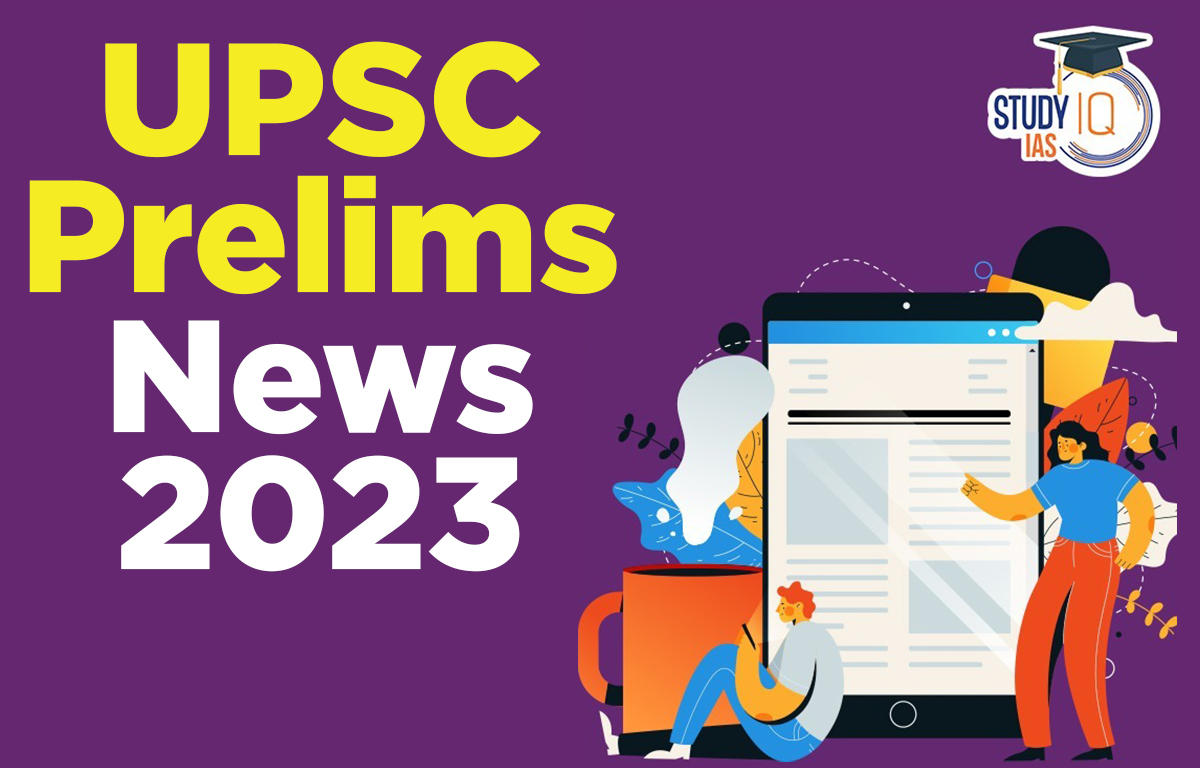UPSC Prelims News of 3 February 2023
Project ELLORA
Why in News? Microsoft Research is helping preserve ‘rare’ Indian languages with its Project ELLORA in India.
About:
- Microsoft launched Project ELLORA or Enabling Low Resource Languages in 2015.
- Microsoft researchers under this project have been working toward creating digital ecosystems for Indian languages that do not have enough presence online.
- Researchers are taking the help of AI and the local community in the data collection process; researchers hope to create a dataset that is both accurate and culturally relevant.
- The main goal of the Project is to impact underserved communities by enabling language technology by creating economic opportunities, building technological skills, enhancing education, and preserving local languages and cultures for future generations.
- Microsoft Research (MSR) has chosen to focus on three languages namely; Gondi, Mundari and Idu Mishmi.
UPSC Prelims News 2 February 2023
Reverse Flipping
Context: Economic Survey 2022-23 has observed that the Indian start-ups are exploring ‘reverse flipping’, or shifting their domicile back to India,
About Reverse Flipping
- Flipping is the process of transferring the entire ownership of an Indian company to an overseas entity, accompanied by a transfer of intellectual property (IP) and all data hitherto owned by the Indian company.
- This effectively transforms an Indian company into a 100% subsidiary of a foreign entity, with the founders and investors retaining the same ownership via the foreign entity, having swapped all shares.
- The phenomenon reflects start-ups venturing out for short-term gains in the dynamic, uncertain geopolitical world.
- Flipping happens at the early stage of the start-ups, driven by commercial, taxation and personal preferences of founders and investors.
- Reverse Flipping is the process of shifting the domicile of those companies back to India who flipped earlier.
- Companies reverse flip because of easy access to capital from private equity and venture capital, changes in rules regarding round-tripping, and the growing maturity of India’s capital market.

Angel Tax
Context: Indian Startups offering their shares to foreign investors may have to pay ‘angel tax’.
About Angel Tax
- Angel tax is the tax that unlisted companies (startups) have to pay on the capital they raise through the issue of shares.
- The tax was previously known as Section 56 (2) (vii b) of the Income Tax Act, and taxes funds raised by startups if they exceed the fair market value of the company.
- The tax was introduced to detect money laundering practices and catch bogus startups.
The New Proposal
- The new finance bill has proposed to amend Section 56(2) VII B of the Income Tax Act which involves taxing equity investment from a resident for the issue of shares that exceeds the face value of such shares.
- According to the proposed amendment, foreign investors will also come under the ambit of the law. Funding from a foreign investor will now be counted as income and be taxed.
- Implications:
- Funding for India’s startups dropped by 33 per cent to $24 billion in 2022 as compared to the previous year. Foreign investors have played a big role in increasing the valuation.
- The new law could compel more startups to flip overseas, as foreign investors may not want additional tax liability due to their investment in the startup.

Deep Ocean Mission
Context: The government has increased the allocation for deep sea exploration and mining.
More on the News:
- The ministry aims to allot money for activities such as a manned submersible, ship-building, exploration and conservation of deep-sea biodiversity and identification of mineral deposits in the deep ocean.
- A manned submersible will be developed to carry three people to a depth of 6,000 metres in the ocean. The goal is to facilitate mineral exploration in the central Indian Ocean.
About Deep Sea Mining
- Deep sea mining involves extracting ores rich in cobalt, manganese, zinc and other rare metals from the sea floor.
- These critical minerals are needed to build batteries for electric vehicles and renewable energy capacity, smartphones and laptops.
- India has already developed Varaha-1, a self-propelled seabed mining machine for the collection of polymetallic nodules (PMN).
Potential Threats
- Deep-sea mining would cause permanent loss of biodiversity in the deep sea, having effects on the ocean ecosystem.

Additional Surveillance Mechanism
Context: The National Stock Exchange (NSE) has placed Adani Enterprises, Adani Ports, and Ambuja Cements under the additional surveillance mechanism (ASM).
- The ASM was introduced on March 26, 2018, with the intention to protect investors from market volatility and unusual changes in share price.
- It is an initiative to enhance market integrity and safeguard the interest of investors.
- Stocks under ASM get monitored for factors such as volatility and price fluctuation.
- Shortlisted stocks are monitored on pre-determined objective criteria and are moved into Trade for Trade segment once the criteria are satisfied.
- The criteria for shortlisting securities to be placed in ASM cover the following parameters:
- High Low Variation
- Client Concentration
- Close-to-Close Price Variation
- Market Capitalisation
- Volume Variation
- Delivery Percentage
- Number of Unique PANs
- Price to Earnings (PE) ratio
- Stocks under ASM cannot be pledged.
- Corporate actions, such as bonuses and dividends are not impacted if a stock is placed under ASM.
- However, if a person has already pledged a stock that has been moved under ASM, they will cease to get collateral margins for that stock. In such case, the stock can be unpledged or kept without collateral till it is taken out of ASM.
Yaya Tso
Context: Yaya Tso has been proposed to become Ladakh’s first biodiversity heritage site.
- Yaya Tso, known as birds’ paradise for its beautiful lake is located at an altitude of 4,820 metres and will be Ladakh’s first BHS under the Biological Diversity Act.
- The proposed Yaya Tso site will have an approximate area of 60 square kilometres, which will also include the lake’s watershed and the lake could be reached from Mahe monastery on the way to Tsomoriri lake after driving up to the nunnery and then crossing a small mountain pass.
- It is a nesting habitat for a large number of birds and animals, such as the bar-headed goose, black-necked crane and brahminy duck.
- It is one of the highest breeding sites of the black-necked crane in India.
Biodiversity Heritage Sites (BHS)
- Biodiversity Heritage Sites (BHS) are areas that are unique, ecologically fragile ecosystems having rich biodiversity comprising of any one or more of the components such as; species richness, high endemism, presence of rare, endemic and threatened species, keystone species, species of evolutionary significance, wild ancestors of domestic/cultivated species or landraces or their varieties, past pre-eminence of biological components represented by fossil beds and having cultural or aesthetic values.

Primary Agricultural Credit Societies (PACS)
Context: The Ministry of Cooperation signed a Memorandum of Understanding (MoU) to enable Primary Agricultural Credit Societies (PACS) to provide services offered by Common Service Centers.
More on the News
- The MoU signed with the Ministry of Electronics and Information Technology, NABARD and CSC e-Governance Services India Limited.
- As per the agreement, PACS will now be able to function as Common Service Centers, along with this, more than 300 services will be made available to the rural population including 13 crore farmer members of PACS.
- Significance: It will increase the business activities of PACS and help them to become self-sustaining economic entities.
What are Primary Agricultural Credit Societies (PACS)?
- PACS are cooperative societies established in rural areas of India to provide short-term credit to farmers for their agricultural and allied activities.
- They are governed by the provisions of the Indian Co-operative Societies Act.
- They form a part of the rural short-term co-operative credit system in India.
- The first Primary Agricultural Credit Society (PACS) was formed in India in the year 1904.
A brief on the Rural Co-Operative Credit System in India:
- The rural co-operative credit system in India is primarily mandated to ensure flow of credit to the agriculture sector.
- It comprises short-term and long-term co-operative credit structures.
- The short-term co-operative credit structure operates with a three-tier system – Primary Agricultural Credit Societies (PACS) at the village level, Central Cooperative Banks (CCBs) at the district level and State Cooperative Banks (StCBs) at the State level.
- PACS are outside the purview of the Banking Regulation Act, 1949 and hence not regulated by the Reserve Bank of India.
- StCBs/DCCBs are registered under the provisions of State Cooperative Societies Act of the State concerned and are regulated by the Reserve Bank.



 UPSC Prelims News 20 March 2023
UPSC Prelims News 20 March 2023
 UPSC Prelims News 17 March 2023
UPSC Prelims News 17 March 2023

















